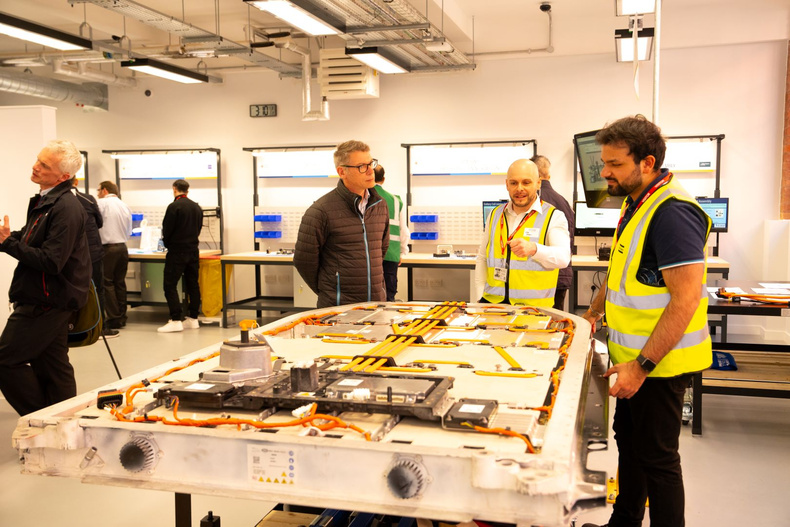Powering up Britain’s battery skills revolution

Written by Rosa Wells, FE Principal & Dean for STEM, University College Birmingham
As the UK accelerates its journey toward net-zero, batteries are no longer just components—they’re cornerstones.
Battery technology now underpins everything from electric vehicles to grid-scale storage and aerospace innovation, with far-reaching implications for the economy, defence, and clean energy transition.
The recently published UK Industrial Strategy sets out a clear ambition: to lead the world in advanced manufacturing and decarbonisation, while reindustrialising in a way that is regionally balanced and skills-driven.
To get there, we’ll need more than investment in infrastructure—we’ll need a workforce ready to power this transformation.
At University College Birmingham (UCB), we are not only responding to this need—we are helping shape the national skills infrastructure for battery and electrification technologies.
Through innovation, partnership and deep engagement with industry, we are leading the way in future-facing technical education.
Built with industry, delivered with purpose
Our flagship Battery Manufacturing Skills Pathway (B‑MSP)—developed in partnership with City & Guilds and backed by Innovate UK—is the UK’s first accredited battery skills programme.
Spanning Level 2 to Level 3, the pathway blends immersive digital learning with hands-on experience in real manufacturing environments.
The course was co-designed with industry partners including Jaguar Land Rover, Autocraft Solutions Ltd, Microsoft, PI‑KEM, Atlas Copco, Delta Cosworth and Yazaki, ensuring it meets the pace and precision the sector demands.
This is not simply training—it is a skills ecosystem.
Students interact with live production equipment used in gigafactories and the broader supply chain, building their capability, confidence and readiness from day one.
This ‘learning factory’ model echoes the Government's Industrial Strategy call for modern, employer-driven technical provision that directly supports industrial scale-up.
Electrification: a national priority, a networked approach
Our work is closely aligned with the Electrification Skills Network (ESN), a UK-wide coalition of employers, training providers and sector leaders, working together to map and deliver the skills required for batteries, power electronics, motors and drives (PEMD).
As a committed member, UCB contributes to the development of cross-sector frameworks, modular learning pathways and occupational standards.
These ensure that our programmes not only align with evolving national benchmarks but also allow learners to move seamlessly between sub-sectors in the green economy—supporting both individual career growth and industrial agility.
The ESN’s convening power supports the ambition laid out in the Industrial Strategy, to create a national skills architecture that is responsive, collaborative and future-proof.
Collaboration and the role of Institutes of Technology
The scale of the electrification challenge demands systemic collaboration—and the response from the sector has been powerful.
We welcome the place-based approach championed by the Battery Innovation Programme (formerly Faraday Battery Challenge), which recognises the strengths of local and regional providers.
We work alongside New College Durham, Newcastle University and Bridgwater & Taunton College, all of whom are developing region-specific solutions to battery skills delivery.
These partnerships ensure our collective response is joined-up, scalable and aligned to employer demand.
At UCB, we are deeply embedded in the Greater Birmingham & Solihull Institute of Technology, which supports delivery of advanced technical education across Birmingham and Solihull.
Similarly, the North East Institute of Technology is working in partnership with the regional battery cluster and the National Battery Training and Skills Academy to deliver localised impact with national relevance.
Perhaps most significantly, UCB is proud to contribute to the National Network of Institutes of Technology — a collaboration of all IoTs across England. This network offers an unprecedented platform to:
- share best practice in battery and electrification skills delivery
- support other colleges and universities to replicate high-impact training models
- champion place-based innovation, ensuring every region can build its own capability
- align education with the UK’s net-zero industrial and energy strategies.
The network enables us to move beyond institutional delivery and support the development of a national green skills infrastructure, in line with the government’s vision for levelling-up, reindustrialisation and energy resilience.
National strategy, local roots
Our B‑MSP programme is supported by Innovate UK as part of the Battery Innovation Programme, and it sits at the intersection of national ambition and regional delivery. It is designed to be inclusive, flexible and future-focused—open to school leavers, career changers, returners and those already in work.
We know that a just transition to net zero requires more than jobs.
It requires access, opportunity and upward mobility.
Our training model supports social equity and place-based economic renewal, aligning directly with the Industrial Strategy’s emphasis on skills as a foundation for sustainable growth.
Why University College Birmingham is leading the curve
At UCB, we bring together:
- the UK’s first accredited battery skills pathway, co-designed with employers
- engagement with the Electrification Skills Network and national frameworks
- a hands-on, real-world training model powered by live industry equipment
- strategic leadership through the Greater Birmingham & Solihull Institute of Technology
- National reach via the National Network of Institutes of Technology, supporting collaboration, scale and impact
- strong partnerships with other forward-thinking institutions to shape place-based solutions to national challenges.
The battery sector is not just a technology frontier—it is a talent challenge.
If we are to realise the promise of clean energy, low-carbon mobility and advanced manufacturing, we must invest in the people who will make it happen.
At University College Birmingham, we are proud to be part of this mission—powering the transition, preparing the workforce, and helping Britain lead the charge.
